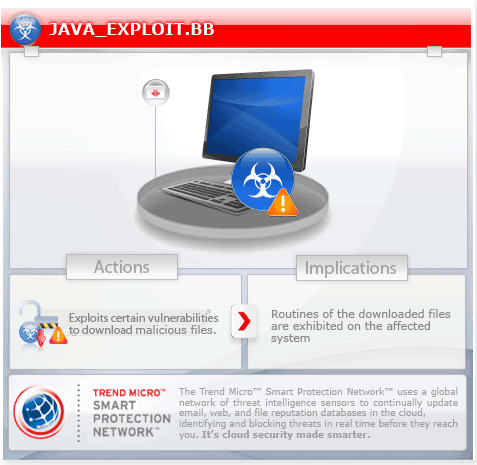JAVA_EXPLOIT.BB
Exploit:Java/CVE-2013-0422 (Microsoft)
Windows 2000, Windows Server 2003, Windows XP (32-bit, 64-bit), Windows Vista (32-bit, 64-bit), Windows 7 (32-bit, 64-bit)


Threat Type: Trojan
Destructiveness: No
Encrypted: Yes
In the wild: Yes
OVERVIEW
This malware is involved in a malicious spam campaign leveraging the April 2013 Boston Marathon Bombing. It takes advantage of certain software vulnerabilities to download malicious files onto the affected system.
To get a one-glance comprehensive view of the behavior of this Trojan, refer to the Threat Diagram shown below.

This Trojan may be hosted on a website and run when a user accesses the said website.
It executes the downloaded files. As a result, malicious routines of the downloaded files are exhibited on the affected system.
TECHNICAL DETAILS
Arrival Details
This Trojan may be hosted on a website and run when a user accesses the said website.
Download Routine
This Trojan takes advantage of the following software vulnerabilities to download possibly malicious files:
It saves the files it downloads using the following names:
- %User Temp%\{random file name}.exe
(Note: %User Temp% is the current user's Temp folder, which is usually C:\Documents and Settings\{user name}\Local Settings\Temp on Windows 2000, XP, and Server 2003, or C:\Users\{user name}\AppData\Local\Temp on Windows Vista, 7, and 8.)
It then executes the downloaded files. As a result, malicious routines of the downloaded files are exhibited on the affected system.
It downloads a possibly malicious file from a certain URL. The URL where this malware downloads the said file depends on the following parameter(s) passed on to it by its components:
- name
SOLUTION
Step 1
Before doing any scans, Windows XP, Windows Vista, and Windows 7 users must disable System Restore to allow full scanning of their computers.
Step 2
Close all opened browser windows
Step 3
Search and delete this file
There may be some component files that are hidden. Please make sure you check the Search Hidden Files and Folders checkbox in the More advanced options option to include all hidden files and folders in the search result.
- %User Temp%\{random file name}.exe
Step 4
Scan your computer with your Trend Micro product to delete files detected as JAVA_EXPLOIT.BB. If the detected files have already been cleaned, deleted, or quarantined by your Trend Micro product, no further step is required. You may opt to simply delete the quarantined files. Please check the following Trend Micro Support pages for more information:
Step 5
Download and apply this security patch Refrain from using these products until the appropriate patches have been installed. Trend Micro advises users to download critical patches upon release by vendors.
Did this description help? Tell us how we did.


